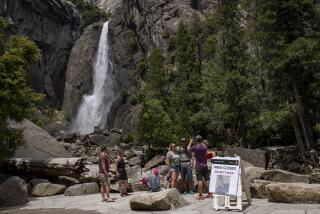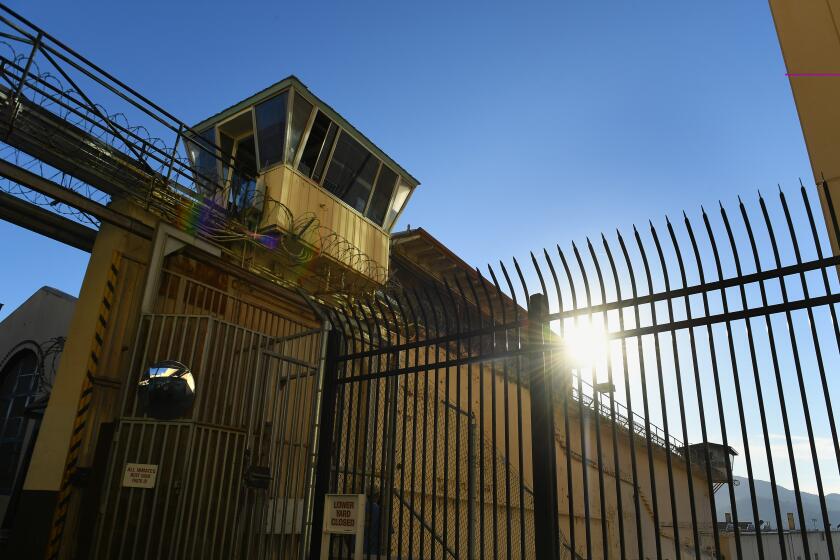How can we make Yosemite safer? And should we?
Yosemite National Park can be a deceptive place. Things look safe that arenât, which the public was jarringly reminded of last week when the Merced River swept away two little boys who were cooling off with their mother near a footbridge some distance below Vernal Fall. A 10-year-old boy died and his 6-year-old brother is still missing.
That section of the river looks relatively calm at this time of year, and the water is shallow right near the edge. But although things are generally drier this time of year, the water still surges powerfully through an area of granite boulders that can knock people out, hold them under water and damage spinal cords.
Last month, a man died under completely different circumstances after a trip to Yosemite. He had been camping at popular Curry Village, where it is believed that he contracted hantavirus, which is typically spread via contact with infected mouse droppings. A woman visiting the park separately was sickened by hantavirus.
Of the 20 or so people who died in Yosemite last year, 13 met their deaths via accidents. Sometimes those accidents are the results of deliberate risk-taking -- people who rock-climb on the sheer face of Half Dome are willingly pursuing a potentially dangerous sport. Sometimes they are the result of people willfully ignoring obvious -- even literal -- signs of danger, such as the three people who were swept over Vernal Fall last summer when they climbed over a protective railing and past strongly worded warning signs to bathe in what looked like a safe pool in the Merced River.
But other times, the situation is less clear. In June 2011, two men died in the seldom-visited Hetch Hetchy Valley. They were on their way home from a backpacking trip when they came to Wapama Falls. In spring, or during wetter years after storms, the waterfall sends pounding streams of water onto the wooden footbridges below. Itâs a matter of of personal judgment whether conditions make it too dangerous to venture onto the bridges. Hiking books warn about the danger, but there were no signs that I could see on a recent trip. In this case, the hikers were 2.5 miles from the trailhead; turning around and taking an alternate route via the backcountry would have cost them more than a day. They decided to try the crossing. One was overpowered by the torrent of water and slipped off the bridge. According to an eyewitness, his hiking campanion let go of the railing in an attempt to save him and both men were swept into the reservoir below.
Each time Yosemite or another wilderness area is the site of an avoidable death, the question inevitably arises of whether the park is doing enough to keep visitors safe. Does it need more railings, more signs? The Times editorial board has repeatedly said no. Yosemite has a lot of signs; in fact, part of the problem could be that there are so many signs, tourists donât bother looking at them. Wilderness is wilderness for a reason; people need some respite from man-made boundaries. (Iâd make an exception for the granite steps up the Mist Trail to Vernal Falls, one of the most hiked trails in the park and one where many people complain about the slippery stone steps and a man died after slipping on one of them into the river. Extra railings make sense there.)
But that doesnât mean the park should give up on additional safety measures. One possibility would be to hand people a separate, eye-catching paper when they enter the park about the dangers and some basic behaviors to avoid tragedy. (âDonât go in the river within a certain distance from a waterfall, whether above or below.â) Tourists already have to stop to pay their fee. Theyâre already handed brochures and other information about the park. It would cost very little money and almost no time to print up these lists in several different languages and for the gate attendant to take just a few seconds to say, âThis list is important. Please read it for your own safety. Very sad things have happened right in this park to people who didnât do these things.â
ALSO:
A bad bet on Indian casinosHow curiosity begat Curiosity
A good teacher is hard to keep
More to Read
A cure for the common opinion
Get thought-provoking perspectives with our weekly newsletter.
You may occasionally receive promotional content from the Los Angeles Times.











